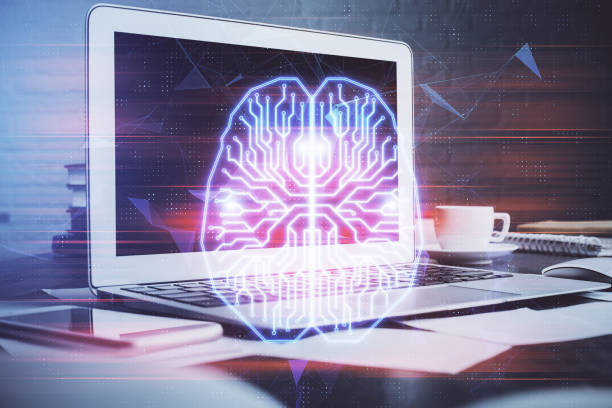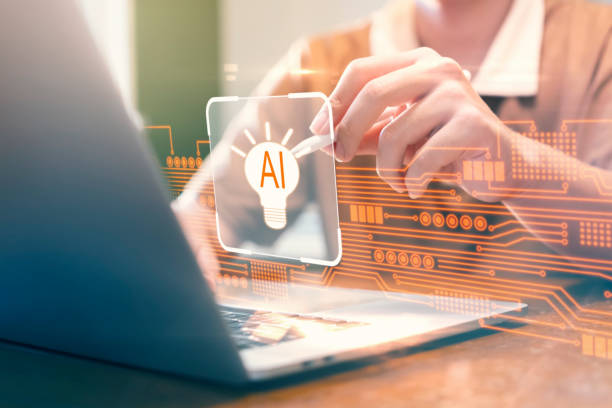What is Artificial Intelligence and What are its Applications?

Artificial Intelligence (AI) refers to the ability of a computer system to mimic human cognitive functions such as learning, problem-solving, and decision-making.
In fact, the goal of #Artificial_Intelligence is to create machines that can perform tasks that currently require human intelligence.
This field includes diverse sub-fields such as Machine Learning, Neural Networks, Natural Language Processing, and Computer Vision.
The applications of artificial intelligence are very extensive and can be found in almost every industry.
Some of these applications include:
Medicine: Disease diagnosis, new drug development, robotic surgery
Finance: Market analysis, risk management, fraud detection
Automotive: Self-driving cars, advanced driver-assistance systems
Manufacturing: Production line automation, quality control
Customer Service: Chatbots, intelligent technical support
Education: Personalized learning systems, automated assessment
These are just a few examples of the countless applications of artificial intelligence, and with technological advancements, we will witness their increasing expansion.
Therefore, understanding the basic concepts and applications of artificial intelligence is essential for everyone in today’s world.
Did you know that 94% of the first impression of a company is related to its website design?
RasawWeb, by providing professional corporate website design services, helps you create the best first impression.
✅ Create a professional and trustworthy image of your brand
✅ Easier attraction of potential customers and improvement of online presence
⚡ Get free corporate website design consultation
Machine Learning: The Backbone of Artificial Intelligence

Machine Learning is one of the most important sub-fields of artificial intelligence that enables machines to learn from data without explicit programming.
In fact, in machine learning, instead of writing code for every scenario, algorithms are trained using data to identify patterns and relationships within the data and make decisions based on them.
There are various types of machine learning algorithms, each suitable for a specific type of problem:
Supervised Learning: In this type of learning, the algorithm is trained using labeled data.
In other words, the data has correct answers, and the algorithm tries to learn the relationship between input and output.
Examples of supervised learning include Regression and Classification.
Unsupervised Learning: In this type of learning, the algorithm is trained using unlabeled data.
The goal here is to identify hidden patterns and structures in the data.
Examples of unsupervised learning include Clustering and Dimensionality Reduction.
Reinforcement Learning: In this type of learning, the algorithm interacts with an environment, receives rewards or penalties, and learns how to maximize a specific goal.
Examples of reinforcement learning include gaming and robotics.
Machine learning plays a vital role in many artificial intelligence applications.
For instance, in fraud detection, machine learning algorithms can identify suspicious transactions by analyzing patterns in financial transactions.
In self-driving cars, machine learning algorithms use sensor data to understand the vehicle’s surroundings and make driving decisions.
Neural Networks and Deep Learning

Neural Networks are a computational model inspired by the structure of the human brain.
These networks consist of many nodes (neurons) connected in layers.
Each connection between two neurons has a weight that indicates the strength of the connection.
Neural networks are trained using data to adjust the weights of connections and learn patterns within the data.
Deep Learning is a sub-field of machine learning that uses deep neural networks (networks with many layers).
Deep neural networks are capable of learning more complex and abstract patterns from data.
Deep learning has made significant progress in recent years and has achieved excellent results in many areas.
For instance, in computer vision, deep neural networks are capable of detecting objects and faces with very high accuracy.
In natural language processing, deep neural networks are capable of translating languages, generating text, and understanding the meaning of sentences.
Neural networks and deep learning have applications in various fields and are expanding day by day.
These technologies play a crucial role in the advancement of artificial intelligence.
| Algorithm | Application |
|---|---|
| Convolutional Neural Networks (CNN) | Computer Vision, Image Recognition |
| Recurrent Neural Networks (RNN) | Natural Language Processing, Text Generation |
Natural Language Processing and Human-Machine Interaction

Natural Language Processing (NLP) is a branch of artificial intelligence that enables machines to understand and generate human language.
NLP includes a wide range of tasks such as speech recognition, machine translation, sentiment analysis, text summarization, and question answering.
Recent advancements in deep learning have led to significant improvements in the performance of NLP systems.
For example, large language models like GPT-3 are capable of generating very fluent and natural texts that are difficult to distinguish from human-written texts.
NLP is used in many applications.
Chatbots use NLP to understand user questions and provide appropriate answers.
Machine translation systems use NLP to translate text from one language to another.
Sentiment analysis systems use NLP to detect emotions present in texts.
NLP plays a crucial role in improving human-machine interaction and enables the use of natural language to interact with computer systems.
Does your current website showcase your brand’s credibility as it should? Or does it drive away potential customers?
RasawWeb, with years of experience in professional corporate website design, is your comprehensive solution.
✅ A modern, beautiful website tailored to your brand identity
✅ Significant increase in lead and new customer acquisition
⚡ Contact RasawWeb now for a free corporate website design consultation!
Computer Vision: How Do Computers See?

Computer Vision is a branch of artificial intelligence that enables machines to understand and interpret images and videos.
In fact, the goal of computer vision is to create systems that can see like humans.
Computer vision includes a wide range of tasks such as object detection, face recognition, motion tracking, 3D reconstruction, and scene analysis.
Computer vision algorithms are trained using image and video data to identify patterns and features within them and make decisions based on them.
Computer vision is used in many applications.
Self-driving cars use computer vision to understand their surroundings.
Video surveillance systems use computer vision to detect suspicious activities.
Medical systems use computer vision to diagnose diseases from medical images.
Computer vision plays a significant role in automating and improving the efficiency of many processes.
Ethics in Artificial Intelligence: Important Considerations

Along with the rapid advancement of artificial intelligence, related ethical issues are also gaining more importance.
The use of artificial intelligence can have serious implications for privacy, justice, transparency, and accountability.
One of the most important ethical issues is discrimination.
If AI algorithms are trained using biased data, they may make discriminatory decisions.
For example, an AI-powered hiring system might inadvertently reject applicants of a certain gender or race.
Another issue is privacy.
AI systems often require large amounts of personal data, and the collection and use of this data can raise privacy concerns.
Transparency and accountability are also important ethical issues.
Decisions made by AI systems should be explainable and auditable.
Responsible development and use of artificial intelligence require serious attention to these ethical issues.
It must be ensured that artificial intelligence is used for the benefit of all members of society and prevents harm to individuals’ rights and freedoms.
The Future of Artificial Intelligence: What Awaits Us?

Artificial intelligence is rapidly advancing and is expected to play an increasingly important role in our lives in the future.
In the future, we will witness the expansion of AI applications in various fields.
Self-driving cars will be widely used and will revolutionize transportation.
Smart systems in homes and cities will help improve the quality of life.
AI in medicine will assist in diagnosing and treating diseases.
Furthermore, AI can bring about major transformations in areas such as education, agriculture, and energy.
However, the advancement of artificial intelligence also comes with challenges.
One of the most important challenges is creating new jobs to replace those automated by artificial intelligence.
Ethical issues related to artificial intelligence must also be seriously considered.
To benefit from the advantages of artificial intelligence and reduce its risks, governments, companies, and researchers must collaborate to develop policies and standards for the responsible development and use of artificial intelligence.
Artificial Intelligence
| Field | Impact of AI |
|---|---|
| Medicine | Faster and more accurate disease diagnosis, development of new drugs |
| Transportation | Self-driving cars, reduction of accidents |
| Manufacturing | Automation, increased productivity |
How to Get Started with Artificial Intelligence?

If you are interested in entering the world of artificial intelligence, there are various ways to start.
One way is to learn the basic concepts of artificial intelligence.
You can increase your knowledge in this field by studying books, articles, and online courses.
Also, you can undertake practical AI projects using open-source tools and libraries like TensorFlow and PyTorch.
Participating in AI conferences and workshops can also help you become familiar with the latest achievements and trends in this field.
Furthermore, by joining online AI communities, you can connect with other enthusiasts and experts in this field and benefit from their experiences.
To learn artificial intelligence, you need knowledge of mathematics and programming.
Therefore, if you are weak in these areas, it is better to strengthen your skills before starting.
Did you know that your company’s website is the first point of contact for 75% of potential customers?
Your website is the face of your brand. With **RasawWeb**’s corporate website design services, create an online presence that builds customer trust.
✅ Create a professional and lasting image of your brand
✅ Attract target customers and increase online credibility
⚡ Get free consultation from **RasawWeb** experts!
Key Concepts in Artificial Intelligence: Important Terminology

To better understand artificial intelligence, familiarity with key concepts in this field is essential.
Some of the most important concepts include: Algorithm, Data, Machine Learning, Neural Networks, Natural Language Processing, Computer Vision, Deep Learning, Reinforcement Learning, Classification, Regression, Clustering, Dimensionality Reduction, Model, Training, Evaluation, Accuracy, Precision, Recall, F1-score, Overfitting, Underfitting, Gradient Descent, Activation Functions, and Cost Functions.
These concepts are used in many artificial intelligence articles and training courses.
By mastering these concepts, you can work more effectively in this field.
Also, familiarity with common terminology in artificial intelligence can help you connect with other experts in this field and benefit from their experiences.
Artificial Intelligence Learning Resources: Where to Get Training?

There are numerous resources for learning artificial intelligence.
Some of the best resources include: Online courses (such as Coursera, edX, and Udacity), books (such as “Artificial Intelligence: A Modern Approach” by Stuart Russell and Peter Norvig), scientific articles (such as papers published at NIPS, ICML, and ICLR conferences), open-source tools and libraries (such as TensorFlow and PyTorch), and online communities (such as Stack Overflow and Reddit).
Artificial Intelligence. You can also participate in in-person courses and AI workshops.
Choosing the right resource for learning artificial intelligence depends on your level of knowledge and experience.
If you are a beginner, it is better to start with online courses and introductory books.
If you have more experience, you can follow scientific articles and practical projects.
Also, by participating in conferences and workshops, you can become familiar with the latest achievements and trends in this field.
Frequently Asked Questions
| Question | Answer |
|---|---|
| What is Artificial Intelligence? | It is the simulation of human intelligence in machines programmed to think like humans and imitate their actions. |
| What are the main branches of Artificial Intelligence? | They include Machine Learning, Deep Learning, Natural Language Processing, Computer Vision, and Robotics. |
| What is Machine Learning? | It is a branch of artificial intelligence that focuses on enabling systems to learn from data and identify patterns without explicit programming. |
| Mention examples of Artificial Intelligence applications in our daily lives. | Voice assistants (like Siri and Alexa), recommendation systems in Netflix and Amazon, self-driving cars, and facial recognition software. |
| What is Deep Learning? | It is a subset of machine learning that uses multi-layered (deep) artificial neural networks to process large amounts of data. |
| What is Natural Language Processing (NLP)? | It is a branch of artificial intelligence that focuses on enabling computers to understand, interpret, and generate human language. |
| What are some ethical concerns related to Artificial Intelligence? | They include data bias, privacy, job displacement, and accountability in case of errors. |
| What are the main benefits of Artificial Intelligence? | Increased efficiency, improved decision-making, automation of repetitive tasks, and discovery of complex patterns in data. |
| How is Artificial Intelligence used in healthcare? | In disease diagnosis, drug discovery, medical image analysis, and personalized patient care. |
| How do you see the future of Artificial Intelligence? | It is expected to continue developing rapidly, affecting all aspects of human life, from industry to education and entertainment. |
And other advertising services from Rasa Web Advertising Agency
- Smart Conversion Rate Optimization: A dedicated service for online growth based on SEO-driven content strategy.
- Smart Data Analysis: A fast and efficient solution for improving SEO ranking with a focus on intelligent data analysis.
- Smart Social Media: Professional optimization to increase sales using Google Ads management.
- Smart Advertorials: A dedicated service for digital branding growth based on Google Ads management.
- Smart Advertorials: A professional solution for increasing sales with a focus on precise audience targeting.
And over hundreds of other services in the field of internet advertising, advertising consultation, and organizational solutions
Internet Advertising | Advertising Strategy | Advertorials
Resources
Basic Concepts of Artificial Intelligence
History and Future of Artificial Intelligence
Artificial Intelligence and Ethical Challenges
The Impact of AI on the Gaming Industry
? Ready to revolutionize your business in the digital world? RasawWeb Afarin Digital Marketing Agency paves your path to success by providing comprehensive services including dedicated website design, SEO, and online advertising.
📍 Tehran, Mirdamad Street, Next to Central Bank, Southern Kazeroun Alley, Ramin Alley, No. 6




